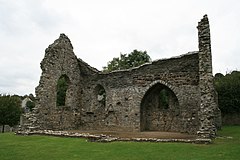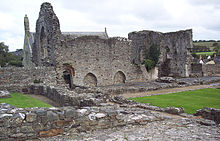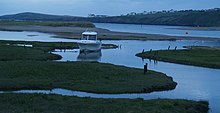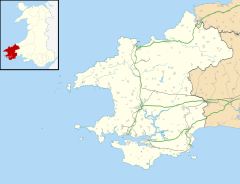St Dogmaels (Welsh: Llandudoch) is a village, parish[2] and community in Pembrokeshire, Wales, on the estuary of the River Teifi, a mile downstream from the town of Cardigan in neighbouring Ceredigion. A little to the north of the village, further along the estuary, lies Poppit Sands beach. The parish includes the small settlement of Cippyn, south of Cemaes Head.[3]
St Dogmaels
| |
|---|---|
 Part of the ruins of St Dogmaels Abbey | |
Location within Pembrokeshire | |
| Population | 1,353 (2011)[1] |
| OS grid reference | SN165459 |
| Community |
|
| Principal area | |
| Preserved county | |
| Country | Wales |
| Sovereign state | United Kingdom |
| Post town | CARDIGAN |
| Postcode district | SA43 |
| Dialling code | 01239 |
| Police | Dyfed-Powys |
| Fire | Mid and West Wales |
| Ambulance | Welsh |
| UK Parliament | |
| Senedd Cymru – Welsh Parliament | |



Name
editThe English and Welsh names seem to bear no similarity, but it has been suggested that possibly both names refer to the same saint or founder Dogmael (Dogfael), with ‘mael’ (prince) and ‘tud’ (land or people of) being added to Dog/doch as in Dog mael and Tud doch.[4] It is the current standard usage not to have a full-stop after the 'St' or an apostrophe in 'Dogmaels'.[5]
History
editSt Dogmaels Abbey is 12th-century Tironesian and was one of the richer monastic institutions in Wales. Adjacent to the abbey ruins is the parish church (Church in Wales) of St Thomas, which appears successively to have occupied at least three sites close to or within the abbey buildings. The present building is a respectable minor Victorian edifice and contains the Ogam Sagranus stone.
St Dogmaels was once a marcher borough. George Owen of Henllys, in 1603, described it as one of five Pembrokeshire boroughs overseen by a portreeve.[6] The parish appeared (as Sct. Dogmels) on a 1578 parish map of Pembrokeshire.[7]
In the 1830s, the parish's population was 2,109,[8] and fell into four areas: Cippyn, Abbey, Pant-y-groes and Bridgend.[9] In 1832, boundary changes meant that a part of Pembrokeshire, including a part of St Dogmaels, was included in Cardiganshire. This was reversed by the Welsh Assembly in 2002.[2]
There are more than 30 listed buildings[10] in the parish, including the parish church,[11] the abbey[12] and the mediaeval flour mill, Y Felin.[13]
In 2006, the village won the Wales Calor Village of the Year competition after beating Trefriw in the final.[14]
Pembrokeshire Coast Path
editThe northern end of the Pembrokeshire Coast Path is often regarded as being at Poppit Sands, near St. Dogmaels, where the official plaque was originally sited[15] but the path now continues to St. Dogmaels,[16][17] where a new marker was unveiled in July 2009.[18] Here the path links with the Ceredigion Coast Path, which continues northwards as part of the Wales Coast Path.[19]
Governance
editAn electoral ward of the same name exists, stretching to include the community of Nevern. The population taken at the 2011 census was 2,218.[20]
Shakespeare in St Dogmaels Abbey
editA Shakespeare play is performed annually in the abbey during the summer since the first play was performed in 1987. The actors are both local and from all parts of Great Britain.[21]
Notable people
edit- Joseph Harris (1773–1825), was born at Llan-ty-ddewi, St. Dogmells. He was a Welsh Baptist minister, author, journal editor and a Welsh language poet. He took the Biblical name of Gomer as his bardic name.[22]
- Rhodri Thomas (born 1942), born in St Dogmaels, a Welsh former first-class cricketer.
Twinning
editSt Dogmaels is twinned with the village of Trédarzec in Côtes-d'Armor, Brittany.
See also
edit- Albro Castle, a former workhouse
- Calor Village of the Year
References
edit- ^ "Community population 2011". Neighbourhood Statistics. Office for National Statistics. Retrieved 21 April 2015.
- ^ a b "GENUKI St Dogmaels". Retrieved 29 July 2019.
- ^ "Dyfed Archaeology Trust: Cippyn". Retrieved 16 March 2018.
- ^ "St Dogmaels - A sense of place" (PDF). Retrieved 11 March 2023.
- ^ "Guidance on house style and use of language mechanics". Wales. 13 November 2019.
- ^ Owen, George, The Description of Penbrokshire by George Owen of Henllys Lord of Kemes, Henry Owen (Ed), London, 1892
- ^ "Penbrok comitat". British Library. Retrieved 22 July 2024.
- ^ S, Lewis (1833). A Topographical Dictionary of Wales.
- ^ "GENUKI Parish Maps 1-4: St Dogmaels". Retrieved 29 July 2019.
- ^ "British Listed Buildings: St Dogmaels". Retrieved 29 July 2019.
- ^ Cadw. "Church of St Thomas (Grade II) (13086)". National Historic Assets of Wales. Retrieved 29 July 2019.
- ^ Cadw. "Ruins of Abbey of St Mary (Grade I) (13102)". National Historic Assets of Wales. Retrieved 29 July 2019.
- ^ Cadw. "Y Felin (Grade II*) (13096)". National Historic Assets of Wales. Retrieved 29 July 2019.
- ^ Calor Village of the Year Archived 2006-12-07 at the Wayback Machine
- ^ "Coast Path Marker". Pembrokeshire Coastal Photography. Retrieved 29 May 2014.
- ^ John, Brian (2012). Pembrokeshire Coast Path. Aurum Press. ISBN 978-1845137823.
- ^ "Pembrokeshire Coast Path: Newport to St Dogmaels". visitpembrokeshire.com. Archived from the original on 18 June 2013. Retrieved 14 August 2013.
- ^ "St Dogmaels to Newport (Town) 16 miles, (25.7 Kilometres)". Planning a Trip. National Trails. Retrieved 14 August 2013.
- ^ "All-Wales coast path moves a step closer at St Dogmaels". BBC News South West Wales. 21 February 2011. Retrieved 14 August 2013.
- ^ "Ward population 2011". Retrieved 21 April 2015.
- ^ "Abbey Shakespeare Players: Shakespeare in St Dogmaels Abbey". Retrieved 16 March 2018.
- ^ Jenkin Jones, Rees M. (1891). . Dictionary of National Biography. Vol. 25. p. 19.
